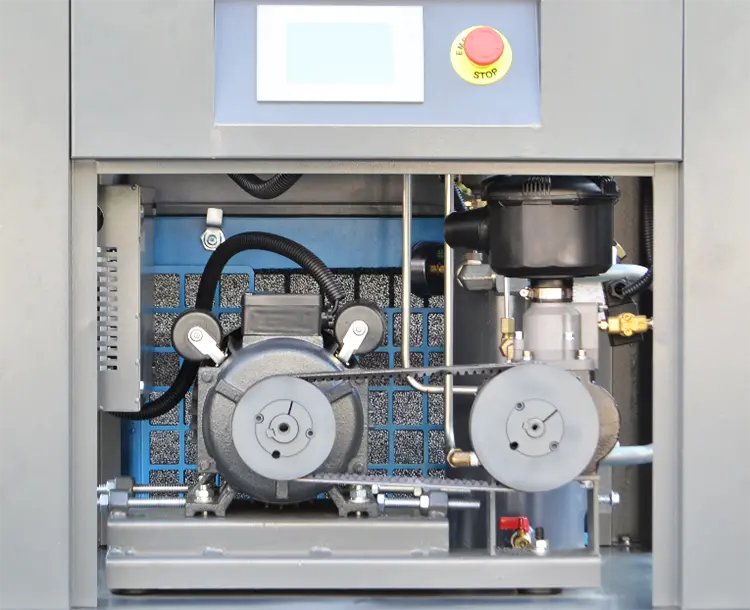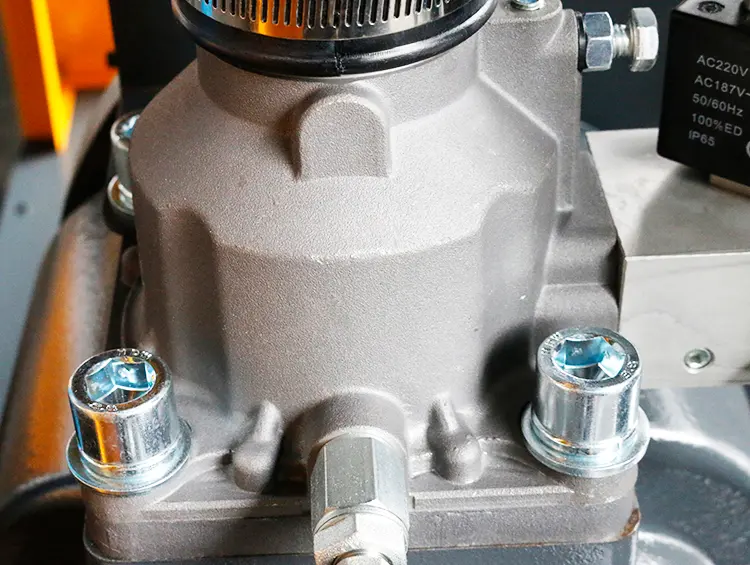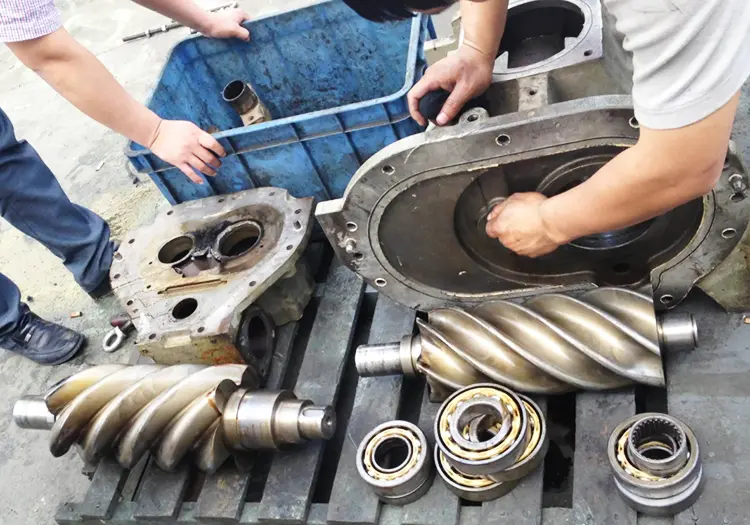Compared with traditional piston compressors, screw compressor noise is usually lower. However, many screw compressors also experience abnormal noise during operation. They are metal collision sound, uniform knocking sound, and so on. Below we will analyze the six reasons for industrial screw compressor noises. Then give corresponding solutions.
1. Drive Belt Too Loose
This will make the active and passive belt groove fit too large. As a result, it causes the slippage and howling sound.
How to determine if the air compressor belt is slipping:
(1) You can smell a burnt belt smell when close to the equipment. Watch carefully for belt debris on the nearby ground;
(2) There is an abnormal friction sound between the pulley and the belt;
(3) High current swing due to uneven loading.
So the slipping belt will result in the screw compressor noise.

How to Solve it?
Rotate the adjusting screw. Adjust the belt to the proper tightness. The amount of deformation is less than 5 mm. But not too tight. Run the industrial compressor under load after readjustment. If it still slips, it needs to replace the air compressor belt.
The belt replacement and belt adjustment procedures are basically the same. But be careful: don’t splash lubricating oil on the belt or pulley. To prevent the belt from slipping.
2. Lack of Oil Causes Screw Air Compressor Noise
Screw compressors sometimes run out of oil. This will make the male and female screws directly engage without lubricating oil. As a result, metal dry friction produces a whistling sound.
For the oil-injected screw compressor, the male rotor rotates the female rotor to drive. But they are not directly linked. Lubricating oil is sprayed into the airend to create an oil film. It acts as an insulator. Therefore, the role of lubricating oil is vital. If there is a phenomenon of “lack of oil,” it will cause direct contact with the screw rotors. There will be a noise. At the same time, it will cause bearing damage, etc.
However, the “lack of oil” in the airend does not necessarily mean that lubricating oil is insufficient. Other reasons may be the local lack of oil and low lubricating oil pressure. Direct causes include oil separator failure, oil cooler, and pipeline blockage. Or because the fuel line fitting is loose.
Indirect faults may include minimum pressure valve failure. Or use unqualified compressor lubricating oil. It may also be that the design of the oil-air separation tank is not good. Or the oil return check valve is damaged. It is also possible that the oil return line was installed improperly. Or the large air consumption causes overload and low-pressure use. All of the above reasons may lead to the noise of the screw air compressor.

How to Deal With it?
Firstly, check the oil level. Then replace the oil filter. At the same time, handle the faulty parts. When adding lubricating oil, let the oil soak to 3/4 of the rotor at least. The oil is often insufficient for those screw compressors that have been idle for a long time. At this time, if you start the machine rashly, it is easy to cause an instant lack of oil. Therefore, it is necessary to add sufficient oil to the airend first. Then turn on the screw compressor again.
3. The Intake Valve is Not Closed Tightly
This will cause a large amount of air leakage. The intake valve backstop produces vibration. In addition, the vibration of the check valve will also generate screw compressor noise.
The Solutions Are As Follows:
Replace or adjust the faulty valve. Pay attention to the following points:
(1) The parts of the screw compressor inlet valve should be clean;
(2) The contact between the valve plate and the valve seat must meet the design requirements. And the take-off amount of valve plate and the specification of spring are also the same;
(3) Test the valve for leaks before installation.
4. Motor Bearing Failure Leads to Industrial Screw Compressor Noise
Firstly, judge the running condition of the industrial compressor motor. When running, use a screwdriver with the tip against the bearing cover. The ears are close to the wooden handle of the screwdriver. Listen for the sound of the bearings. If the rolling sound is monotonous and uniform, the bearing is good. So the motor is running normally.
If there is abnormal noise, analyze the cause and deal with it;
(1) The bearing clearance is too large if you hear the apparent rolling sound. Or the bearings are severely worn. We need to replace the bearings;
(2) The sound of the rolling element is hoarse. And the tone is heavy. It indicates that the bearing grease is too dirty. Clean the bearings with kerosene. And replace with new lubricating oil;
(3) The rolling elements have irregular impact sounds. It shows that individual rolling elements of the bearing are broken. It should change the bearing;
(4) There is a whistling sound. And mixed with the rolling sound. Indicates that the bearing lacks lubricating grease. We need to add clean lubricating oil.
5. Screw Compressor Airend Failure
There are impurities in the airend. This will cause a stuck-point collision between the male and female screws. As a result, the screw air compressor produces howling noise. It will also eventually damage the airend bearings.

Solving Plans Are Below:
Repair the airend and re-adjust its clearance. Generally speaking, the gap ratio of the screw compressor should be between 0.8 and 1.2 million. The high-speed rotation of the screw compressor will change the clearance. Due to thermal deformation and wear of the tooth profile, the running face clearance tends to decrease. The non-following surface clearance tends to increase. Therefore, during maintenance, increase the clearance of the chasing surface a little. Make the non-chasing gap smaller. It is more reasonable to make the ratio of the two between 1.0 and 1.2.
6. Silencer System Damage Causes The Noise of Industrial Screw Air Compressor
The sound attenuation system of the screw compressor consists of the following components: chassis, bracket, frame, door panel, sound attenuation cotton, sealing strip, and other parts.
Solution: Check that these parts are intact. Also, check for loose bolts. The compressor will excite vibrations in various components. These vibrations will cause abnormal noise if not appropriately taken measures.
To sum up, there are many different abnormal noises of screw compressors. The reasons are also different. We must take corresponding measures to solve the fault as soon as possible. Ensure the safe operation of the compressor.
